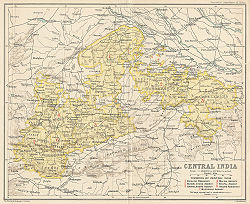Bhopawar Agency
| Bhopawar Agency | |||||
| Sub-agency of the Central India Agency | |||||
|
|||||
| Map of the Central India Agency with the Bhopawar Agency located at its western end | |||||
| History | |||||
| • | Merger of Bhil Agency and Bhil Sub-agency | 1882 | |||
| • | Merger into Malwa Agency | 1937 | |||
| Area | |||||
| • | 1901 | 19,902 km2(7,684 sq mi) | |||
| Population | |||||
| • | 1901 | 547,546 | |||
| Density | 27.5 /km2 (71.3 /sq mi) | ||||
Bhopawar Agency was a sub-agency of the Central India Agency in British India with the headquarters at the town of Bhopawar, so the name. Bhopawar Agency was created in 1882 from a number of princely states in the Western Nimar and Southern Malwa regions of Central India belonging to the former Bhil Agency and Bhil Sub-agency with the capitals at Bhopawar and Manpur. The agency was named after Bhopawar, a village in Sardarpur tehsil, Dhar District of present-day Madhya Pradesh state. Manpur remained a strictly British territory.
The other chief towns of this region were: Badnawar, Kukshi, Manawar and Sardargarh. The mighty Vindhya and Satpura ranges crossed the territory of the agency roughly from east to west, with the fertile valley of the Narmada River lying between them. The agency also included the "Bhil Country", inhabited by the Bhil people.
At the time of its 1882 establishment, the agency had a total area of 7,684 square miles (19,900 km2), and its population was 547,546 according to the 1901 census. In 1904 certain districts were transferred from this agency to the Indore Residency, created in 1899, and the area of Bhopawar was thus reduced by 3,283 square miles (8,500 km2).
In 1925 Bhopawar Agency was merged into Malwa Agency, and in 1927 the agency was renamed the Malwa-Bhopawar States Agency, which was renamed again as the Malwa Agency in 1934.
...
Wikipedia

